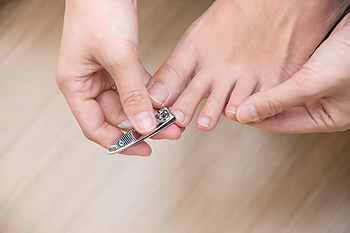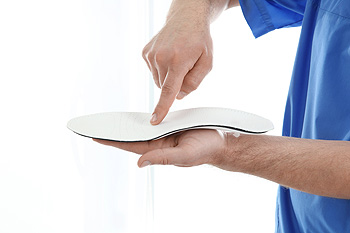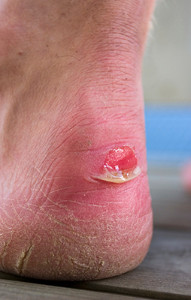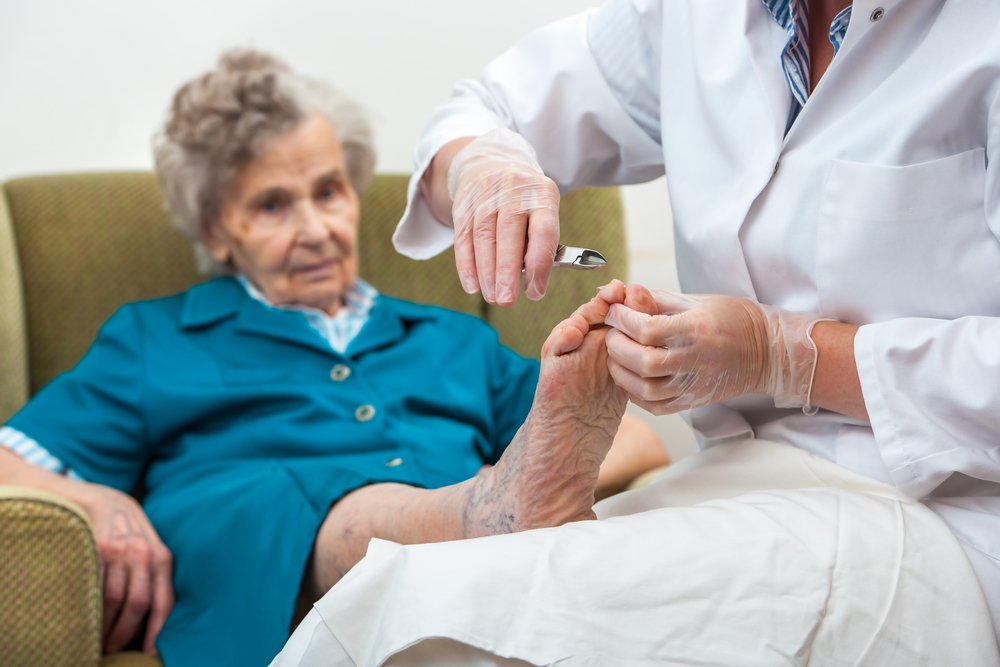 When the feet are properly cared for on a daily basis, certain foot conditions may be prevented from occurring. Athlete’s foot may be avoided when the feet are washed and thoroughly dried daily, especially between the toes. When a good moisturizer is applied, it may help to prevent cracked heels from developing. The importance of trimming the toenails properly is necessary in possibly preventing the painful condition known as ingrown toenails. Additionally, the feet will feel more comfortable when the correct size shoe is worn, and this can be accomplished if shoes are tried on in the afternoon when the feet are their largest. If you would like additional information about how to maintain proper foot care, it is advised to seek the counsel of a podiatrist.
When the feet are properly cared for on a daily basis, certain foot conditions may be prevented from occurring. Athlete’s foot may be avoided when the feet are washed and thoroughly dried daily, especially between the toes. When a good moisturizer is applied, it may help to prevent cracked heels from developing. The importance of trimming the toenails properly is necessary in possibly preventing the painful condition known as ingrown toenails. Additionally, the feet will feel more comfortable when the correct size shoe is worn, and this can be accomplished if shoes are tried on in the afternoon when the feet are their largest. If you would like additional information about how to maintain proper foot care, it is advised to seek the counsel of a podiatrist.
Everyday foot care is very important to prevent infection and other foot ailments. If you need your feet checked, contact Dr. Richard DiMario from Maine. Our doctor can provide the care you need to keep you pain-free and on your feet.
Everyday Foot Care
Often, people take care of their bodies, face and hair more so than they do for their feet. But the feet are a very important aspect of our bodies, and one that we should pay more attention to. Without our feet, we would not be able to perform most daily tasks.
It is best to check your feet regularly to make sure there are no new bruises or cuts that you may not have noticed before. For dry feet, moisturizer can easily be a remedy and can be applied as often as necessary to the affected areas. Wearing shoes that fit well can also help you maintain good foot health, as well as making it easier to walk and do daily activities without the stress or pain of ill-fitting shoes, high heels, or even flip flops. Wearing clean socks with closed shoes is important to ensure that sweat and bacteria do not accumulate within the shoe. Clean socks help to prevent Athlete’s foot, fungi problems, bad odors, and can absorb sweat.
If you have any questions please feel free to contact our office located in York, ME . We offer the newest diagnostic and treatment technologies for all your foot and ankle needs.
 Orthotics are prescribed shoe inserts that can correct biomechanical foot issues. A podiatrist can evaluate your foot to see if a customized orthotic device is necessary, or if a standard shoe insert will suffice. Should you need orthotics, there are two different kinds. One type is rigid orthotics, otherwise known as functional orthotics. They are typically made from a material such as plastic, and are used in shoes with low heels in order to ease foot strain. The other type is soft orthotics, also known as accommodative orthotics. These provide a soft cushioning to help with issues such as plantar fasciitis or diabetic foot ulcers. These orthotics are bulky, so a special type of shoe may be required. Orthotics are typically more expensive than shoe inserts, but may last longer as they are made specifically for you. If you believe you may benefit from orthotics, or would like more information, you should consult with a podiatrist.
Orthotics are prescribed shoe inserts that can correct biomechanical foot issues. A podiatrist can evaluate your foot to see if a customized orthotic device is necessary, or if a standard shoe insert will suffice. Should you need orthotics, there are two different kinds. One type is rigid orthotics, otherwise known as functional orthotics. They are typically made from a material such as plastic, and are used in shoes with low heels in order to ease foot strain. The other type is soft orthotics, also known as accommodative orthotics. These provide a soft cushioning to help with issues such as plantar fasciitis or diabetic foot ulcers. These orthotics are bulky, so a special type of shoe may be required. Orthotics are typically more expensive than shoe inserts, but may last longer as they are made specifically for you. If you believe you may benefit from orthotics, or would like more information, you should consult with a podiatrist.
If you are having discomfort in your feet and would like to try orthotics, contact Dr. Richard DiMario from Maine. Our doctor can provide the care you need to keep you pain-free and on your feet.
What Are Orthotics?
Orthotics are inserts you can place into your shoes to help with a variety of foot problems such as flat feet or foot pain. Orthotics provide relief and comfort for minor foot and heel pain but can’t correct serious biomechanical problems in your feet.
Over-the-Counter Inserts
Orthotics come in a wide variety of over-the-counter inserts that are used to treat foot pain, heel pain, and minor problems. For example, arch supports can be inserted into your shoes to help correct overarched or flat feet, while gel insoles are often used because they provide comfort and relief from foot and heel pain by alleviating pressure.
Prescription Orthotics
If over-the-counter inserts don’t work for you or if you have a more severe foot concern, it is possible to have your podiatrist prescribe custom orthotics. These high-quality inserts are designed to treat problems such as abnormal motion, plantar fasciitis, and severe forms of heel pain. They can even be used to help patients suffering from diabetes by treating foot ulcers and painful calluses and are usually molded to your feet individually, which allows them to provide full support and comfort.
If you are experiencing minor to severe foot or heel pain, it’s recommended to speak with your podiatrist about the possibilities of using orthotics. A podiatrist can determine which type of orthotic is right for you and allow you to take the first steps towards being pain-free.
If you have any questions please contact our office located in York, ME . We offer the newest diagnostic and treatment technologies for all your foot and ankle needs.
 Many people who enjoy running and hiking can experience unpleasant blisters forming on their feet. This is often a result of friction that happens from the shoes or socks rubbing against the skin. The first layer of skin will typically become damaged, and a small pocket of fluid will form over the raw area. This acts as a natural barrier for protection, and will gradually drain as the healing process occurs. A successful measure that can be implemented which can help to prevent painful blisters from developing can include wearing shoes and socks that fit correctly. This will help in making sure there is adequate room so the heel does not rub on the back of the shoe. If the blister should become injured and drain before the skin has healed, an infection may occur. If this occurs, it is important to cover the affected area with a bandage until the skin has completely healed. If you are frequently getting foot blisters, it is advised to speak to a podiatrist who can guide you toward proper shoe fitting.
Many people who enjoy running and hiking can experience unpleasant blisters forming on their feet. This is often a result of friction that happens from the shoes or socks rubbing against the skin. The first layer of skin will typically become damaged, and a small pocket of fluid will form over the raw area. This acts as a natural barrier for protection, and will gradually drain as the healing process occurs. A successful measure that can be implemented which can help to prevent painful blisters from developing can include wearing shoes and socks that fit correctly. This will help in making sure there is adequate room so the heel does not rub on the back of the shoe. If the blister should become injured and drain before the skin has healed, an infection may occur. If this occurs, it is important to cover the affected area with a bandage until the skin has completely healed. If you are frequently getting foot blisters, it is advised to speak to a podiatrist who can guide you toward proper shoe fitting.
Blisters are prone to making everyday activities extremely uncomfortable. If your feet are hurting, contact Dr. Richard DiMario of Maine. Our doctor can provide the care you need to keep you pain-free and on your feet.
Foot Blisters
Foot blisters develop as a result of constantly wearing tight or ill-fitting footwear. This happens due to the constant rubbing from the shoe, which can often lead to pain.
What Are Foot Blisters?
A foot blister is a small fluid-filled pocket that forms on the upper-most layer of the skin. Blisters are filled with clear fluid and can lead to blood drainage or pus if the area becomes infected.
How Do Blisters Form?
Blisters on the feet are often the result of constant friction of skin and material, usually by shoe rubbing. Walking in sandals, boots, or shoes that don’t fit properly for long periods of time can result in a blister. Having consistent foot moisture and humidity can easily lead to blister formation.
Prevention & Treatment
It is important to properly care for the affected area in order to prevent infection and ease the pain. Do not lance the blister and use a Band-Aid to provide pain relief. Also, be sure to keep your feet dry and wear proper fitting shoes. If you see blood or pus in a blister, seek assistance from a podiatrist.
If you have any questions, please feel free to contact our office located in York, ME . We offer the newest diagnostic and treatment technologies for all your foot care needs.
 Research has indicated that most babies are born with flat feet. This is typically the result of muscles, tendons, and ligaments that have not fully developed yet. When the child starts to walk, it is encouraged to walk barefoot while indoors. The toes will grasp the floor naturally, and this is beneficial in strengthening the entire foot. When walking begins, the foot should be properly measured so the correct size shoe can be determined. It is important for the soles to be flexible, in addition to confirming there is adequate room for the toes to move freely in. Some children will walk with their toes pointing inward or outward. If this pertains to your child, it is suggested to consult with a podiatrist who can properly examine your child’s feet.
Research has indicated that most babies are born with flat feet. This is typically the result of muscles, tendons, and ligaments that have not fully developed yet. When the child starts to walk, it is encouraged to walk barefoot while indoors. The toes will grasp the floor naturally, and this is beneficial in strengthening the entire foot. When walking begins, the foot should be properly measured so the correct size shoe can be determined. It is important for the soles to be flexible, in addition to confirming there is adequate room for the toes to move freely in. Some children will walk with their toes pointing inward or outward. If this pertains to your child, it is suggested to consult with a podiatrist who can properly examine your child’s feet.
The health of a child’s feet is vital to their overall well-being. If you have any questions regarding foot health, contact Dr. Richard DiMario of Maine. Our doctor can provide the care you need to keep you pain-free and on your feet.
Tips for Keeping Children's Feet Healthy
If you have any questions, please feel free to contact our office located in York, ME . We offer the newest diagnostic and treatment technologies for all your foot care needs.
 Diabetic patients may develop serious foot conditions as a result of elevated blood sugar levels. Some people experience neuropathy. Symptoms of this ailment often include a numbing or tingling sensation, and it may be painful to walk. Additionally, it can be difficult to feel any cuts or irritations on the feet, and this may lead to the formation of diabetic foot ulcers. This occurs when the cuts become infected, and if not promptly treated, gangrene may develop. People who are diabetic often notice changes in the feet. These consist of swelling, ingrown toenails, extremely dry skin, and temperature changes. If there are open wounds, it is suggested to keep the area covered and dry, and it may be beneficial to wear a supportive boot. Diabetic patients are urged to be under the care of a podiatrist who can properly treat any foot condition that is associated with diabetes.
Diabetic patients may develop serious foot conditions as a result of elevated blood sugar levels. Some people experience neuropathy. Symptoms of this ailment often include a numbing or tingling sensation, and it may be painful to walk. Additionally, it can be difficult to feel any cuts or irritations on the feet, and this may lead to the formation of diabetic foot ulcers. This occurs when the cuts become infected, and if not promptly treated, gangrene may develop. People who are diabetic often notice changes in the feet. These consist of swelling, ingrown toenails, extremely dry skin, and temperature changes. If there are open wounds, it is suggested to keep the area covered and dry, and it may be beneficial to wear a supportive boot. Diabetic patients are urged to be under the care of a podiatrist who can properly treat any foot condition that is associated with diabetes.
Diabetic foot care is important in preventing foot ailments such as ulcers. If you are suffering from diabetes or have any other concerns about your feet, contact Dr. Richard DiMario from Maine. Our doctor can provide the care you need to keep you pain-free and on your feet.
Diabetic Foot Care
Diabetes affects millions of people every year. The condition can damage blood vessels in many parts of the body, especially the feet. Because of this, taking care of your feet is essential if you have diabetes, and having a podiatrist help monitor your foot health is highly recommended.
The Importance of Caring for Your Feet
Patients with diabetes should have their doctor monitor their blood levels, as blood sugar levels play such a huge role in diabetic care. Monitoring these levels on a regular basis is highly advised.
It is always best to inform your healthcare professional of any concerns you may have regarding your feet, especially for diabetic patients. Early treatment and routine foot examinations are keys to maintaining proper health, especially because severe complications can arise if proper treatment is not applied.
If you have any questions please feel free to contact our office located in York, ME . We offer the newest diagnostic and treatment technologies for all your foot and ankle needs.